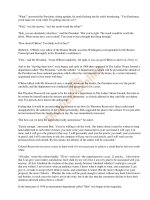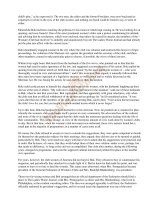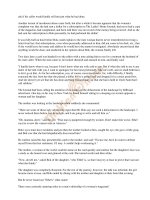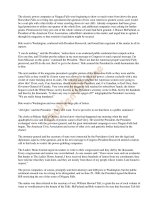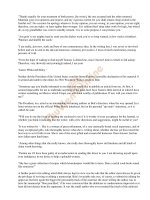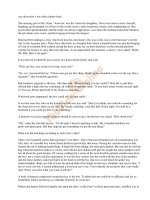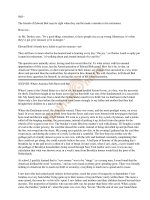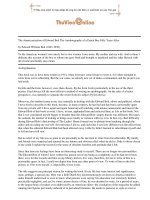The Americanization of Edward Bok 13
Bạn đang xem bản rút gọn của tài liệu. Xem và tải ngay bản đầy đủ của tài liệu tại đây (168.29 KB, 10 trang )
child's play," as he expressed it. The two men, the editor and the former President, were now bracketed as
copartners in crime in the eyes of the club-women, and nothing too harsh could be found to say or write of
either.
Meanwhile Bok had been watching the petitions for his removal which kept coming in. He was looking for an
opening, and soon found it. One of the most prominent women's clubs sent a protest condemning his attitude
and advising him by resolutions, which were enclosed, that unless he ceased his attacks, the members of the --
Woman's Club had resolved "to unitedly and unanimously boycott The Ladies' Home Journal and had already
put the plan into effect with the current issue."
Bok immediately engaged counsel in the city where the club was situated, and instructed his lawyer to begin
proceedings, for violation of the Sherman Act, against the president and the secretary of the club, and three
other members; counsel to take particular pains to choose, if possible, the wives of three lawyers.
Within forty-eight hours Bok heard from the husbands of the five wives, who pointed out to him that the
women had acted in entire ignorance of the law, and suggested a reconsideration of his action. Bok replied by
quoting from the petition which set forth that it was signed "by the most intelligent women of -- who were
thoroughly versed in civic and national affairs"; and if this were true, Bok argued, it naturally followed that
they must have been cognizant of a legislative measure so well known and so widely discussed as the
Sherman Act. He was basing his action, he said, merely on their declaration.
Bok could easily picture to himself the chagrin and wrath of the women, with the husbands laughing up their
sleeves at the turn of affairs. "My wife never could see the humor in the situation," said one of these husbands
to Bok, when he met him years later. Bok capitulated, and then apparently with great reluctance, only when
the club sent him an official withdrawal of the protest and an apology for "its ill-considered action." It was
years after that one of the members of the club, upon meeting Bok, said to him: "Your action did not increase
the club's love for you, but you taught it a much-needed lesson which it never forgot."
Up to this time, Bok had purposely been destructive in his criticism. Now, he pointed out a constructive plan
whereby the woman's club could make itself a power in every community. He advocated less of the cultural
and more of the civic interest, and urged that the clubs study the numerous questions dealing with the life of
their communities. This seems strange, in view of the enormous amount of civic work done by women's clubs
to-day. But at that time, when the woman's club movement was unformed, these civic matters found but a
small part in the majority of programmes; in a number of cases none at all.
Of course, the clubs refused to accept or even to consider his suggestions; they were quite competent to decide
for themselves the particular subjects for their meetings, they argued; they did not care to be tutored or guided,
particularly by Bok. They were much too angry with him even to admit that his suggestions were practical and
in order. But he knew, of course, that they would adopt them of their own volition--under cover, perhaps, but
that made no difference, so long as the end was accomplished. One club after another, during the following
years, changed its programme, and soon the supposed cultural interest had yielded first place to the needful
civic questions.
For years, however, the club-women of America did not forgive Bok. They refused to buy or countenance his
magazine, and periodically they attacked it or made light of it. But he knew he had made his point, and was
content to leave it to time to heal the wounds. This came years afterward, when Mrs. Pennypacker became
president of the General Federation of Women's Clubs and Mrs. Rudolph Blankenburg, vice-president.
Those two far-seeing women and Bok arranged that an official department of the Federation should find a
place in The Ladies' Home Journal, with Mrs. Pennypacker as editor and Mrs. Blankenburg, who lived in
Philadelphia, as the resident consulting editor. The idea was arranged agreeably to all three; the Federation
officially endorsed its president's suggestion, and for several years the department was one of the most
The Legal Small Print 126
successful in the magazine.
The breach had been healed; two powerful forces were working together, as they should, for the mutual good
of the American woman. No relations could have been pleasanter than those between the editor-in-chief of the
magazine and the two departmental editors. The report was purposely set afloat that Bok had withdrawn from
his position of antagonism (?) toward women's clubs, and this gave great satisfaction to thousands of women
club-members and made everybody happy!
At this time the question of suffrage for women was fast becoming a prominent issue, and naturally Bok was
asked to take a stand on the question in his magazine. No man sat at a larger gateway to learn the sentiments
of numbers of women on any subject. He read his vast correspondence carefully. He consulted women of
every grade of intelligence and in every station in life. Then he caused a straw-vote to be taken among a
selected list of thousands of his subscribers in large cities and in small towns. The result of all these inquiries
was most emphatic and clear: by far the overwhelming majority of the women approached either were
opposed to the ballot or were indifferent to it. Those who desired to try the experiment were negligible in
number. So far as the sentiment of any wide public can be secured on any given topic, this seemed to be the
dominant opinion.
Bok then instituted a systematic investigation of conditions in those states where women had voted for years;
but he could not see, from a thoughtful study of his investigations, that much had been accomplished. The
results certainly did not measure up to the prophecies constantly advanced by the advocates of a nation-wide
equal suffrage.
The editor now carefully looked into the speeches of the suffragists, examined the platform of the National
body in favor of woman suffrage, and talked at length with such leaders in the movement as Susan B.
Anthony, Julia Ward Howe, Anna Howard Shaw, and Jane Addams.
All this time Bok had kept his own mind open. He was ready to have the magazine, for whose editorial policy
he was responsible, advocate that side of the issue which seemed for the best interests of the American
woman.
The arguments that a woman should not have a vote because she was a woman; that it would interfere with
her work in the home; that it would make her more masculine; that it would take her out of her own home;
that it was a blow at domesticity and an actual menace to the home life of America--these did not weight with
him. There was only one question for him to settle: Was the ballot something which, in its demonstrated value
or in its potentiality, would serve the best interests of American womanhood?
After all his investigations of both sides of the question, Bok decided upon a negative answer. He felt that
American women were not ready to exercise the privilege intelligently and that their mental attitude was
against it.
Forthwith he said so in his magazine. And the storm broke. The denunciations brought down upon him by his
attitude toward woman's clubs was as nothing compared to what was now let loose. The attacks were bitter.
His arguments were ignored; and the suffragists evidently decided to concentrate their criticisms upon the
youthful years of the editor. They regarded this as a most vulnerable point of attack, and reams of paper were
used to prove that the opinion of a man so young in years and so necessarily unformed in his judgment was of
no value.
Unfortunately, the suffragists did not know, when they advanced this argument, that it would be overthrown
by the endorsement of Bok's point of view by such men and women of years and ripe judgment as Doctor
Eliot, then president of Harvard University, former President Cleveland, Lyman Abbott, Margaret Deland, and
others. When articles by these opponents to suffrage appeared, the argument of youth hardly held good; and
The Legal Small Print 127
the attacks of the suffragists were quickly shifted to the ground of "narrow-mindedness and old-fashioned
fogyism."
The article by former President Cleveland particularly stirred the ire of the attacking suffragists, and Miss
Anthony hurled a broadside at the former President in a newspaper interview. Unfortunately for her best
judgment, and the strength of her argument, the attack became intensely personal; and of course, nullified its
force. But it irritated Mr. Cleveland, who called Bok to his Princeton home and read him a draft of a proposed
answer for publication in Bok's magazine.
Those who knew Mr. Cleveland were well aware of the force that he could put into his pen when he chose,
and in this proposed article he certainly chose! It would have made very unpleasant reading for Miss Anthony
in particular, as well as for her friends. Bok argued strongly against the article. He reminded Mr. Cleveland
that it would be undignified to make such an answer; that it was always an unpopular thing to attack a woman
in public, especially a woman who was old and ill; that she would again strive for the last word; that there
would be no point to the controversy and nothing gained by it. He pleaded with Mr. Cleveland to meet Miss
Anthony's attack by a dignified silence.
These arguments happily prevailed. In reality, Mr. Cleveland was not keen to attack Miss Anthony or any
other woman; such a thought was foreign to his nature. He summed up his feeling to Bok when he tore up the
draft of his article and smilingly said: "Well, I've got if off my chest, that is the main thing. I wanted to get it
out of my system, and talking it over has driven it out. It is better in the fire," and he threw the torn paper into
the open grate.
As events turned out, it was indeed fortunate that the matter had been so decided; for the article would have
appeared in the number of Bok's magazine published on the day that Miss Anthony passed away. It would
have been a most unfortunate moment, to say the least, for the appearance of an attack such as Mr. Cleveland
had in mind.
This incident, like so many instances that might be adduced, points with singular force to the value of that
editorial discrimination which the editor often makes between what is wise or unwise for him to publish. Bok
realized that had he encouraged Mr. Cleveland to publish the article, he could have exhausted any edition he
might have chosen to print. Times without number, editors make such decisions directly against what would
be of temporary advantage to their publications. The public never hears of these incidents.
More often than not the editor hears "stories" that, if printed, would be a "scoop" which would cause his
publication to be talked about from one end of the country to the other. The public does not give credit to the
editor, particularly of the modern newspaper, for the high code of honor which constantly actuates him in his
work. The prevailing notion is that an editor prints all that he knows, and much that he does not know.
Outside of those in the inner government circles, no group of men, during the Great War, had more
information of a confidential nature constantly given or brought to them, and more zealously guarded it, than
the editors of the newspapers of America. Among no other set of professional men is the code of honor so
high; and woe betide the journalist who, in the eyes of his fellow-workers, violates, even in the slightest
degree, that code of editorial ethics. Public men know how true is this statement; the public at large, however,
has not the first conception of it. If it had, it would have a much higher opinion of its periodicals and
newspapers.
At this juncture, Rudyard Kipling unconsciously came into the very centre of the suffragists' maelstrom of
attack when he sent Bok his famous poem: "The Female of the Species." The suffragists at once took the
argument in the poem as personal to themselves, and now Kipling got the full benefit of their vitriolic abuse.
Bok sent a handful of these criticisms to Kipling, who was very gleeful about them. "I owe you a good laugh
over the clippings," he wrote. "They were delightful. But what a quantity of spare time some people in this
world have to burn!"
The Legal Small Print 128
It was a merry time; and the longer it continued the more heated were the attacks. The suffragists now had a
number of targets, and they took each in turn and proceeded to riddle it. That Bok was publishing articles
explaining both sides of the question, presenting arguments by the leading suffragists as well as known
anti-suffragists, did not matter in the least. These were either conveniently overlooked, or, when referred to at
all, were considered in the light of "sops" to the offended women.
At last Bok reached the stage where he had exhausted all the arguments worth printing, on both sides of the
question, and soon the storm calmed down.
It was always a matter of gratification to him that the woman who had most bitterly assailed him during the
suffrage controversy, Anna Howard Shaw, became in later years one of his stanchest friends, and was an
editor on his pay-roll. When the United States entered the Great War, Bok saw that Doctor Shaw had
undertaken a gigantic task in promising, as chairman, to direct the activities of the National Council for
Women. He went to see her in Washington, and offered his help and that of the magazine. Doctor Shaw,
kindliest of women in her nature, at once accepted the offer; Bok placed the entire resources of the magazine
and of its Washington editorial force at her disposal; and all through America's participation in the war, she
successfully conducted a monthly department in The Ladies' Home Journal.
"Such help," she wrote at the close, "as you and your associates have extended me and my co-workers; such
unstinted co-operation and such practical guidance I never should have dreamed possible. You made your
magazine a living force in our work; we do not see now how we would have done without it. You came into
our activities at the psychological moment, when we most needed what you could give us, and none could
have given with more open hands and fuller hearts."
So the contending forces in a bitter word-war came together and worked together, and a mutual regard sprang
up between the woman and the man who had once so radically differed.
XXVIII. Going Home with Kipling, and as a Lecturer
It was in June, 1899, when Rudyard Kipling, after the loss of his daughter and his own almost fatal illness
from pneumonia in America, sailed for his English home on the White Star liner, Teutonic. The party
consisted of Kipling, his wife, his father J. Lockwood Kipling, Mr. and Mrs. Frank N. Doubleday, and Bok. It
was only at the last moment that Bok decided to join the party, and the steamer having its full complement of
passengers, he could only secure one of the officers' large rooms on the upper deck. Owing to the sensitive
condition of Kipling's lungs, it was not wise for him to be out on deck except in the most favorable weather.
The atmosphere of the smoking-room was forbidding, and as the rooms of the rest of the party were below
deck, it was decided to make Bok's convenient room the headquarters of the party. Here they assembled for
the best part of each day; the talk ranged over literary and publishing matters of mutual interest, and Kipling
promptly labelled the room "The Hatchery,"--from the plans and schemes that were hatched during these
discussions.
It was decided on the first day out that the party, too active-minded to remain inert for any length of time,
should publish a daily newspaper to be written on large sheets of paper and to be read each evening to the
group. It was called The Teuton Tonic; Mr. Doubleday was appointed publisher and advertising manager; Mr.
Lockwood Kipling was made art editor to embellish the news; Rudyard Kipling was the star reporter, and Bok
was editor.
Kipling, just released from his long confinement, like a boy out of school, was the life of the party--and when,
one day, he found a woman aboard reading a copy of The Ladies' Home Journal his joy knew no bounds; he
turned in the most inimitable "copy" to the Tonic, describing the woman's feelings as she read the different
departments in the magazine. Of course, Bok, as editor of the Tonic, promptly pigeon-holed the reporter's
"copy"; then relented, and, in a fine spirit of large-mindedness, "printed" Kipling's peans of rapture over Bok's
The Legal Small Print 129
subscriber. The preparation of the paper was a daily joy: it kept the different members busy, and each evening
the copy was handed to "the large circle of readers"--the two women of the party--to read aloud. At the end of
the sixth day, it was voted to "suspend publication," and the daily of six issues was unanimously bequeathed
to the little daughter of Mr. Lockwood de Forest, a close friend of the Kipling family--a choice bit of
Kiplingania.
One day it was decided by the party that Bok should be taught the game of poker, and Kipling at once offered
to be the instructor! He wrote out a list of the "hands" for Bok's guidance, which was placed in the centre of
the table, and the party, augmented by the women, gathered to see the game.
A baby had been born that evening in the steerage, and it was decided to inaugurate a small "jack-pot" for the
benefit of the mother. All went well until about the fourth hand, when Bok began to bid higher than had been
originally planned. Kipling questioned the beginner's knowledge of the game and his tactics, but Bok retorted
it was his money that he was putting into the pot and that no one was compelled to follow his bets if he did
not choose to do so. Finally, the jack-pot assumed altogether too large dimensions for the party, Kipling
"called" and Bok, true to the old idea of "beginner's luck" in cards, laid down a royal flush! This was too
much, and poker, with Bok in it, was taboo from that moment. Kipling's version of this card-playing does not
agree in all particulars with the version here written. "Bok learned the game of poker," Kipling says; "had the
deck stacked on him, and on hearing that there was a woman aboard who read The Ladies' Home Journal
insisted on playing after that with the cabin-door carefully shut." But Kipling's art as a reporter for The Tonic
was not as reliable as the art of his more careful book work.
Bok derived special pleasure on this trip from his acquaintance with Father Kipling, as the party called him.
Rudyard Kipling's respect for his father was the tribute of a loyal son to a wonderful father.
"What annoys me," said Kipling, speaking of his father one day, "is when the pater comes to America to have
him referred to in the newspapers as 'the father of Rudyard Kipling.' It is in India where they get the relation
correct: there I am always 'the son of Lockwood Kipling.'"
Father Kipling was, in every sense, a choice spirit: gentle, kindly, and of a most remarkably even
temperament. His knowledge of art, his wide reading, his extensive travel, and an interest in every phase of
the world's doings, made him a rare conversationalist, when inclined to talk, and an encyclopedia of
knowledge as extensive as it was accurate. It was very easy to grow fond of Father Kipling, and he won Bok's
affection as few men ever did.
Father Kipling's conversation was remarkable in that he was exceedingly careful of language and wasted few
words.
One day Kipling and Bok were engaged in a discussion of the Boer problem, which was then pressing. Father
Kipling sat by listening, but made no comment on the divergent views, since, Kipling holding the English side
of the question and Bok the Dutch side, it followed that they could not agree. Finally Father Kipling arose and
said: "Well, I will take a stroll and see if I can't listen to the water and get all this din out of my ears."
Both men felt gently but firmly rebuked and the discussion was never again taken up.
Bok tried on one occasion to ascertain how the father regarded the son's work.
"You should feel pretty proud of your son," remarked Bok.
"A good sort," was the simple reply.
"I mean, rather, of his work. How does that strike you?" asked Bok.
The Legal Small Print 130

